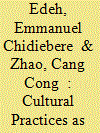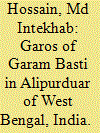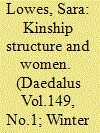|
|
|
Sort Order |
|
|
|
Items / Page
|
|
|
|
|
|
|
| Srl | Item |
| 1 |
ID:
186604


|
|
|
|
|
| Summary/Abstract |
China’s One Belt One Road (OBOR) centres on building a harmonious world, by reorienting the already tumultuous international community, towards the path of sustainable, peaceful and harmonious coexistence. From a cultural perspective, the OBOR is a heritage, an embodiment of brilliant civilization, glorious historic past and extraordinary creativity of mankind. It harbours both tangible and intangible representations of the values, beliefs, traditions and lifestyles of prior generations that are valuable to the present generations. Evidence of historical socioeconomic development and intricacies thrived on the exchange of cultural values shared by all mankind. By drawing from diverse conceptual frameworks embedded in traditional Chinese cultural values, the study offers an insightful illustration of cultural practices in contemporary China’s socioeconomic development through the OBOR. Capturing how cultural values underpins the socioeconomic development pattern in OBOR, geopolitical decisions and actions aimed at managing conflicts and the inclusive nature of OBOR.
|
|
|
|
|
|
|
|
|
|
|
|
|
|
|
|
| 2 |
ID:
165135


|
|
|
|
|
| Summary/Abstract |
The article is a modest attempt to shed light on the socio-cultural life of the Garos, one of the few remaining matrilineal tribes of the world holding a distinctive cultural tradition, of Garam Basti in Alipurduar district of West Bengal, India. Emphasis has also been given to delineate the eccentric traditional aspects therein, some of which are typically unique to the tribe, and also to look at the trends of change. In addition, this article outlines some of the major anthropological features of the tribe. It is based on ethnographic method. The facts and findings presented here are mostly gathered through empirical field work with the help of participatory observation, interview, case study, group discussion and key informant interview methods and techniques. Besides, different relevant available research references have also been consulted. The abovementioned issues have been examined and discussed empirically and put the information in an organized and systematic manner.
|
|
|
|
|
|
|
|
|
|
|
|
|
|
|
|
| 3 |
ID:
171114


|
|
|
|
|
| Summary/Abstract |
Economists are increasingly interested in understanding how culture shapes outcomes for women and the origins of these cultural practices. I review recent work in economics on how culture affects the well-being of women in developing countries, much of which is motivated by work in anthropology. I present evidence on the role of kinship structure, particularly matrilineal relative to patrilineal systems, for shaping women's preferences, exposure to domestic violence, and the health and education of children. Additionally, I discuss research on the effects of cultural practices, such as bride-price, and how the organization of production affects gender norms. Economists, with a careful focus on causal identification, contribute to the evidence that culture is an important determinant of outcomes for women.
|
|
|
|
|
|
|
|
|
|
|
|
|
|
|
|
|
|
|
|
|